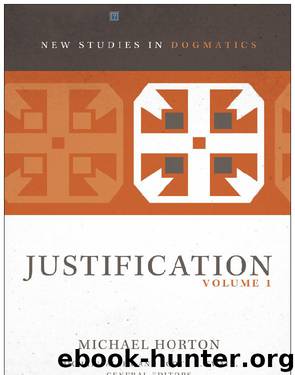Justification, Volume 1 by Unknown

Author:Unknown
Language: eng
Format: epub
Published: 2020-03-01T16:00:00+00:00
In other words, if Luther were not a nominalist, he would have found Aquinas’s spousal logic compelling and adequate.
But this misunderstands the Reformer’s position. Luther has no trouble with love, even love infused, as a necessary grace in believers. (Certainly, later Lutheran and Reformed theologians wrote expansively on this theme.) On the contrary, he regards genuine love and its expression in good works as possible—in fact, inevitable—only on the ground of objective peace with God in justification. The word of God (specifically, the gospel) produces faith, faith produces love, and love produces good works. For Luther, mixing up that order serves no one. God is offended rather than satisfied, the believer has been deceived, and the neighbor is not served.
Luther is not a hyper-Augustinian who, bathed in nominalist logic, merely opts for God over humans in doing bulk of the work. Rather, his problem is making the fruit the root and confusing justification with sanctification. Only when we are persuaded of Christ’s trustworthiness for our entire salvation do we begin to love him—and in him begin to love the Father and the Spirit. Is this so disanalogous to marital love? Further, notice Luther’s point. Even in Waldstein’s quote, Luther laments the fact that Rome puts “their love” in the place of Christ. Of course Luther does not maintain that love is excluded from this union, but he insists that it is the fruit of trust in Christ. Since love is the summary of the law, justification by love is equivalent to justification by the law.
In the Reformers’ writings the marital union of the believer to Christ is not merely a piece of devotional piety but attains a systematic role in delineating the blessings of salvation. The realism of this union, including the grace at work within believers, refutes any charge of nominalism. In his 1535 Commentary on Galatians, Luther wrote,
Christ and I must be joined together so that He lives in me and I in Him—and what a wonderful way of speaking this is. For because He lives in me, whatever there is in me of grace, righteousness, life, peace, salvation, is all His but in such a way that it is mine through this inseparable union and conjunction which I have with Him through faith. Through this faith Christ and I are made one body, as it were, and spirit. Now because Christ lives in me there must be present with Him grace, righteousness, life, and salvation whereas the Law, sin, and death are absent; in fact, the Law is crucified and devoured and destroyed along with sin, death, and the devil. Thus Paul tries to draw us wholly away from ourselves and transplant us into Christ by faith in Him, so that in the matter of justification we think of nothing else but grace and separate this from the Law and works which must have no place in this matter.25
Download
This site does not store any files on its server. We only index and link to content provided by other sites. Please contact the content providers to delete copyright contents if any and email us, we'll remove relevant links or contents immediately.
Waking Up in Heaven: A True Story of Brokenness, Heaven, and Life Again by McVea Crystal & Tresniowski Alex(37808)
Empire of the Sikhs by Patwant Singh(23084)
We're Going to Need More Wine by Gabrielle Union(19045)
Hans Sturm: A Soldier's Odyssey on the Eastern Front by Gordon Williamson(18590)
Leonardo da Vinci by Walter Isaacson(13336)
The Radium Girls by Kate Moore(12026)
Tools of Titans by Timothy Ferriss(8393)
Educated by Tara Westover(8053)
How to Be a Bawse: A Guide to Conquering Life by Lilly Singh(7486)
Permanent Record by Edward Snowden(5846)
The Last Black Unicorn by Tiffany Haddish(5635)
The Rise and Fall of Senator Joe McCarthy by James Cross Giblin(5280)
Promise Me, Dad by Joe Biden(5153)
The Wind in My Hair by Masih Alinejad(5095)
A Higher Loyalty: Truth, Lies, and Leadership by James Comey(4959)
The Crown by Robert Lacey(4814)
The Iron Duke by The Iron Duke(4354)
Joan of Arc by Mary Gordon(4109)
Stalin by Stephen Kotkin(3965)
